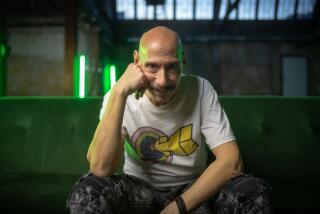Disco duckiness
- Share via
In the middle of the sweaty, happy crowd dancing Wednesday at the Echo, a man in a straw boater and fancy silk cravat held aloft a majestic yellow fan. Imaginative onlookers might have thought it was the Spirit of Disco, come down to bless Hercules and Love Affair, the Brooklyn-based ensemble onstage. Embossed, colorful fans were an emblem of early disco, when the subculture still thrived in multiracial, gay-dominated clubs, before it became suburbanized. Dancers used them to beat the heat in time-traveling style.
Hercules and Love Affair time-travels too: through lyrics that evoke Greek mythology and in music that touches on peak moments in club music’s history, especially early 1970s New York. During that long-forgotten, recently revived period, DJs spun a dazzlingly eclectic range of music for devotees bent on finding a slice of utopia on the dance floor.
Hercules -- the brainchild of 29-year-old DJ Andy Butler -- seeks to match the artistic ambition and spiritual awareness of that golden age while incorporating the lessons of what came later, from Eurodisco to deep house to hitmakers such as Bronski Beat and Dee Lite. Unlike many young groups that reference disco, Hercules is earnest and bent on beauty, not camp. Its self-titled debut album, released in March, is a song cycle that uses the story of the Greek strongman and his lover Hylas to explore themes of loneliness, pride and survival.
At the Echo, the dreams described in those songs came alive, in enthusiastic, untidy human form. Butler stayed behind his synthesizers, surrounded by seven bandmates crammed onto the small stage. He played off the live rhythm section, the preprogrammed music melding with the more volatile elements to produce a sound whose rough edges still served the overall groove
Visual interest was provided by two singers: Nomi Ruiz, an elegant gender-bender with a creamy alto, and Kim Ann Foxman, boyish in a mohawk, with a sharper-edged voice slightly reminiscent of this year’s other dance-minded breakthrough artist, Santogold. (The third Hercules singer, otherworldly chanteur Antony Hegarty, doesn’t tour with the group.) A trumpeter and trombone player added punch and a vintage sheen that connected this music to the soul revivalism of fellow New Yorkers like the Dap-Kings.
Most band members wore tank tops emblazoned with the word “banjee” (a slang term for gay men of color who project a tough image). Only Ruiz was disco-fabulous, in three costume changes worth of sparkly attire. Gay liberation is integral to the positive image Hercules projects; with moodily angelic vocals mounting over thick, insistent beats, songs such as “Athene,” “Hercules Theme” and “Blind” had an inspirational tone.
The group also offered one goofy cover: a heady, appropriately ominous reworking of “Don’t Fear the Reaper” by heavy-metal progenitors Blue Oyster Cult. Not only did this choice heal the historical division between disco and hard rock, it further cemented the group’s links to the turn of the 1970s, when DJs would routinely mix rock, soul and jazz in their sets.
That referential streak, not to mention Butler’s classicist preoccupations, marks Hercules and Love Affair as a somewhat bookish outfit, not really given to decadence. Early in the set, members (especially the singers, who for all their underground chic seemed like timid schoolgirls at first) radiated an uncertainty that hardly invoked the majestic stars of disco at its peak.
But as the rhythms took hold, the band relaxed, and everyone was caught in the swirl. The aspect of vintage disco most worth reviving -- its ability to create gods and goddesses for the night -- was in full effect, and Hercules and Love Affair lived up to its name.
--
More to Read
The biggest entertainment stories
Get our big stories about Hollywood, film, television, music, arts, culture and more right in your inbox as soon as they publish.
You may occasionally receive promotional content from the Los Angeles Times.









